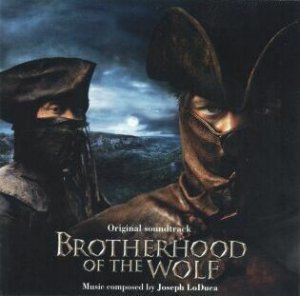Joseph LoDUCA
Brotherhood of the Wolf (Le Pacte des Loups)
Additional music by Robbie Gall
OST
Virgin Records America 7243-8-11248-2-6 [70:41]

If you simply told me that one of the best scores of 2001 is by Joseph LoDuca, I would probably suggest that you begin a very large regimen of vitamins and medications. The composer of TV's "Hercules" and "Xena: Warrior Princess" is neither renowned for originality, nor oft praised for dramatic depth.
Yet his music for the French-made "Le Pacte des Loups" (translated as "Brotherhood of the Wolf" in my neck of the woods) is a surprise. Whether it is because of less temp-tracking, more creative leeway, an artistic revelation for the composer, or some combination of these possibilities, the score outlines this atypical werewolf movie -- set in France during the mid-18th century, inspired by actual events, and gleefully wallowing not only in horror, but also lust, secret ceremonies, fantasy, and martial arts -- with atypical flair. It almost obnubilates the composer's previous musical indiscretions.
Whenever the score starts down a familiar lane, it soon shifts its stride and makes a turn down an unexpected (and usually quite dark) path. There are electronics, violent rhythms, and ethnic sounds from Spain, France, India, and even China. It has a gothic air. There are also lush dances and romantic interjections, the sort that would be entirely pleasant were it not for twisted subtleties, or uncertainty left over from what came before.
'Easy listening' does not apply.
Intelligent film music is rare. There is a potential among filmgoers to invest scores with dramatic qualities they lack, especially with regard to good (or at least popular) films. Others threaten the dramatic impact music does possess by turning it into a matter of sheer academics. The ideal is somewhere in the middle, in a well-written and extremely dramatic film score. "Brotherhood of the Wolf" falls short in both departments; however, it is extraordinarily balanced, and gets close enough to the goal to earn high praise while remaining distanced at a point where its underachievement is simply accepted rather than viewed as a source of annoyance. There is a method to this madness.
Its intelligence is grounded in an emotional understanding. Edges are softened into a strangely beautiful fog, and then danger leaps from the haze. And consider the opening. It is unassuming, perhaps mildly sympathetic, yet a primal current rises from below. Anticipated faults in technique are no match for LoDuca's shocking dramatic solidarity. The non-traditional noises support a structure. Yes, I also admit to giving the soundtrack bonus points for making me check the cover to reaffirm the answer to the question, "Joseph LoDuca wrote this?" If it is not a revelation for the composer, it is still a revelation for this listener.
Presentation of the disc is altogether standard. Given that it has 21 tracks (the last a conventional song by LoDuca, performed by Felicia Sorenson), one might appreciate the presence of track times even more than usual.
I nominated this for the Film Music on the Web Awards, second only to "A.I." and "Final Fantasy: The Spirits Within", two other scores that experiment with sounds and structures in very different, almost equally dramatic ways. "Brotherhood of the Wolf" takes a rougher approach, but every minute of it possesses a cause for interest, for fascination.
Jeffrey Wheeler

Return to Index